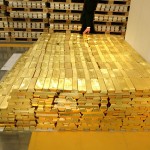Gold futures hovered around the strongest level in two weeks on Wednesday, amid signs of increasing physical demand in China and as escalating tensions over Ukraine heightened its safe-haven appeal. Assets in the SPDR Gold Trust, the biggest bullion-backed ETF, fell to a one-month low yesterday.
On the Comex division of the New York Mercantile Exchange, gold futures for settlement in June rose by 0.21% to trade at $ 1 311.90 an ounce by 06:58 GMT. Prices shifted in a daily range between $1 314.30 an ounce and $1 309.00 an ounce. Yesterday, the contract touched $ 1 314.70 an ounce, the strongest since March March 25. The precious metal settled last week 0.6 percent higher, snapping two straight 5-day periods of declines.
Bullion has lost 3.1% in March as the US economy expanded at a faster-than-expected pace and after Federal Reserve Chair Janet Yellen said the central bank’s bond-buying program may be brought to an end this fall, with borrowing costs starting to rise by mid-2015. The Federal Reserve trimmed its monthly bond-buying program by $10 billion at the last three meetings.
However, the precious metal has climbed 8.1 percent this year, rebounding from the worst annual drop since 1981, as a rout in emerging markets and Russia’s annexation of Crimea boosted safe-haven demand.
Complicated geopolitical situation
Renewed tensions in Ukraine increased demand for the precious metal as a store of value. Yesterday, pro-Russian protesters seized arms in one city in eastern Ukraine, while declaring a separatist republic in another, a move which Kiev said was a replay of the events that preceded the annexation of Crimea last month. Kiev’s pro-European government attributed the seizure of public buildings as part of Moscow’s plan to justify an invasion in eastern Ukraine.
The US Secretary of State John Kerry blamed Russian forces and special agents for spurring separatist moods in eastern Ukraine, hinting that Russian President Vladimir Putin might be preparing for military action as it did on the Crimean peninsula.
“Gold is going to rebound some more in the short term,” said Mark To, head of research at Hong Kongs Wing Fung Financial Group, cited by Thomson Reuters. “After the Crimea annexation, I think people are more and more concerned that the rest of the Ukraine territory will be in danger somehow,” he added, indicating that would drive risk aversion and push up bullion prices.
Chinese demand
Physical demand in China seemed to have accelerated slightly.
On the Shanghai Gold Exchange, bullion prices traded nearly $1 an ounce above spot prices for the first time since the beginning of March. Last week, they were trading at a discount of as much as $10 an ounce due to the weak demand.
According to data by the World Gold Council, China overtook India as the largest global consumer of the precious metal last year, consuming a record 1 066 tons.
Fed stimulus outlook
Investors’ attention is now focused on the minutes from the March 18-19 Fed policy meeting, due to be released at 18:00 GMT today. The Federal Open Market Committee, which cut monthly asset purchases by $10 billion at each of its past three meetings, is set to reconvene at the end of the month.
Bullion drew support last week after Federal Reserve Chair Janet Yellen said the central bank needed to do more to fight against unemployment, because keeping interest rates near zero for more than five years and swelling its balance sheet with asset purchases seemed not to be enough. She also added that the US economy still needed monetary stimulus for “some time” and that most of the Fed officials shared the same opinion.
Assets in the SPDR Gold Trust, the biggest bullion-backed ETP, were reduced to 806.48 tons yesterday, the weakest level since March 7. The fund has not received any fresh inflows in almost four weeks after. It lost 41% of its assets in 2013 that wiped almost $42 billion in value. A total of 553 tons has been withdrawn last year.





